
Arjuna, also known as Partha and Dhananjaya, is a protagonist of the Hindu epic Mahabharata. In the epic he is the third of five Pandava brothers, from the lineage of the Kuru. In the Mahabharata War, Arjuna was a key warrior from the Pandava side and killed many warriors. Before the beginning of the war, his mentor Krishna gave him the supreme knowledge of the Bhagavad Gita to overcome his moral dilemmas.
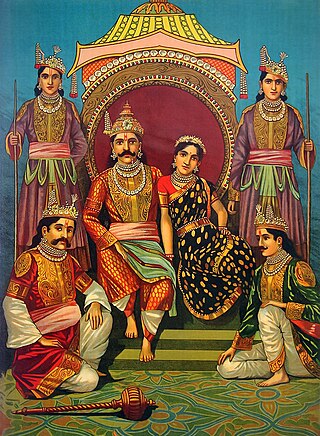
The Pandavas is a group name referring to the five legendary brothers, Yudhishtira, Bhima, Arjuna, Nakula and Sahadeva, who are central figures of the Hindu epic Mahabharata. They are acknowledged as the sons of Pandu, the King of Kuru, but were fathered by different Devas (gods) due to Pandu's cursed inability to naturally conceive children. In the epic, the Pandavas married Draupadi, the princess of Panchala, and founded the city of Indraprastha after the Kuru Kingdom was split to avoid succession disputes. After the split, the other part of the kingdom was ruled by their cousins, the Kauravas. However, the Pandavas lost their kingdom to Duryodhana when Yudhishtira gambled it away during a game of dice. The bet Yudhishtira agreed to was that the Pandavas would hand the kingdom to the Kauravas and go into exile for 13 years. After this time the Kauravas refused to return the kingdom. As a result, the Pandavas waged a civil war against their extended family, and this conflict was known as the Kurukshetra War. With the help of the god Krishna, the Pandavas eventually won the war with the death of the Kauravas, albeit at great cost.
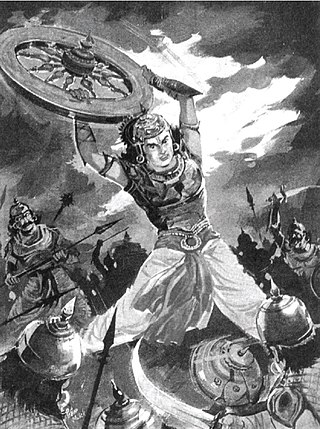
Abhimanyu is a warrior in the Hindu epic Mahabharata. He was the son of Arjuna and Subhadra, the younger sister of Krishna. Abhimanyu is portrayed as a young, strong and talented warrior. He was also one of the few individuals, along with his father, who knew the technique to enter the Chakravyuha, a powerful military formation.

Kripa, also known as Kripacharya, is a figure in Hindu mythology. According to the epic Mahabharata, he was a council member of Kuru Kingdom and a teacher of the Pandava and Kaurava princes.
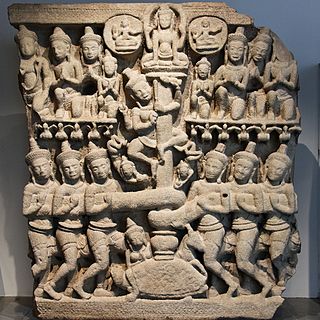
Hindu mythological wars are the wars described in the Hindu texts of ancient India. These wars depicted both mortals of great prowess as well as deities and supernatural beings, often wielding supernatural weapons of great power. Hindu teachings prescribe war as the final option, to be employed only after all peaceful methods are exhausted. Participation in righteous war, or dharmayuddha, was said to be honourable and was a principal duty of the Kshatriya or the warrior varna, and victory in such wars was regarded as a matter of honour.
Koovagam is a village in the Ulundurpettai taluk in Kallakurichi district, Tamil Nadu. It is famous for its annual festival of transgender individuals, which takes fifteen days in the Tamil month of Chitrai (April/May).

Chedi was a kingdom which fell roughly in the Bundelkhand division of Madhya Pradesh regions to the south of river Yamuna along the river Ken. Its capital city was called Suktimati in Sanskrit.

Iravan also known as Iravat and Iravant, is a minor character from the Hindu epic Mahabharata. The son of Pandava prince Arjuna and the Naga princess Ulupi, Iravan is the central deity of the cult of Kuttantavar (Kuttandavar) which is also the name commonly given to him in that tradition—and plays a major role in the sect of Draupadi. Both these sects are of Tamil origin, from a region of the country where he is worshipped as a village deity and is known as Aravan. He is also a patron god of well-known transgender communities called Alis.
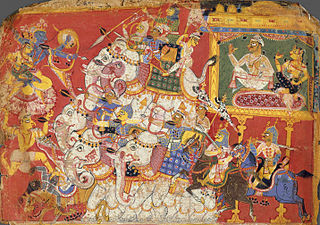
Bhagadatta was the son of Narakasura, and the king of Pragjyotisha in Hindu mythology. Bhagadatta was born from a limb of the asura called Bashkala. He was a renowned warrior, and was known to be a great friend of Indra. When Arjuna embarked on a conquest to help his brother Yudhishthira perform the rajasuya yajna, Bhagadatta was one of the first kings to be conquered by him.
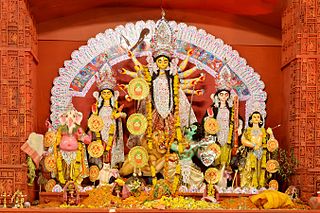
Ayudha Puja is a Hindu observance that falls on the ninth day of the bright half of the moon's cycle of 15 days in the month of September/October, popularly a part of the Navaratri festival. While the Navaratri festival is observed all over the country, the festivity that is widely marked as Ayudha Puja possesses slight variations of veneration and practices across India.
Ashwatthama, also referred to as Drauni, is the son of Drona and a major character in the Hindu epic, the Mahabharata.

The Thripuliyoor Mahavishnu Temple is a Hindu temple dedicated to Vishnu and located in Puliyoor, Alappuzha District, Kerala, South India. Constructed in the Kerala style of architecture, the temple is glorified in the Nalayira Divya Prabandham, the early medieval Tamil canon of the Alvar saints from the 6th–9th centuries CE. It is one of the 108 Divya Desams dedicated to Vishnu, who is worshipped as Mayapiran/Thripuliyoorappan. The nearest railway station to the temple is located at Chengannur, while the nearest airport is Trivandrum International airport.
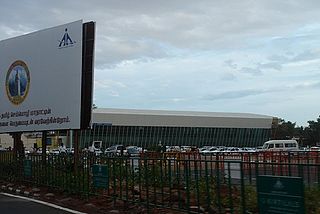
Coimbatore is a city in the state of Tamil Nadu, India. Most transportation in the city and suburbs is by road. Coimbatore is well-connected to most cities and towns in India by road, rail, and air, but not through waterways. The city has successful transport infrastructure compared to other Indian cities, though road infrastructures are not well maintained and developed according to the growing needs of transport, making traffic congestion a major problem in the city. A comprehensive transport development plan has been made to address many traffic problems.
In the Hindu epic Mahabharata, the Upapandavas, also known as Pandavaputras, Draupadeyas or Panchakumaras are the five sons of Queen Draupadi from each of the five Pandavas. They are Prativindhya, Sutasoma, Shrutakarma, Shatanika and Shrutasena. They were Maharathis, as mentioned by Bhishma, and fought the Kurukshetra war on the side of the Pandavas and slew many enemy warriors. They were as ferocious as their fathers but other than that, not much is said in the Mahabharata about the brothers. They were very strong and they were only defeated by remarkably few Kaurava warriors.
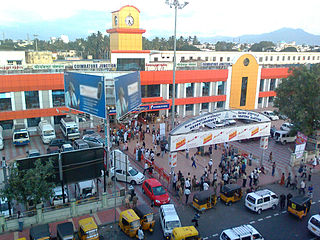
Coimbatore or Kovai is a major city in the Indian state of Tamil Nadu. It is the second largest city and urban agglomeration in the state after Chennai and the sixteenth largest urban agglomeration in India. It is administered by the Coimbatore Municipal Corporation and is the administrative capital of Coimbatore district. It is one of the fastest growing tier-II cities in India and a major textile, industrial, commercial, educational, information technology, healthcare and manufacturing hub of Tamil Nadu. It is often referred to as the "Manchester of South India" due to its cotton production and textile industries.
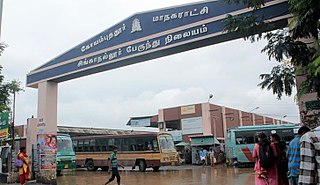
Singanallur is a major residential locality of the city of Coimbatore in Tamil Nadu, India. It is located on the banks of Noyyal river, which runs to the southern boundary of the locality. It is situated in the eastern part of the city, and is a major hub for the inter-city bus services towards Southern and Central districts of Tamilnadu from the city. It is one of the well developed neighborhoods in the city and has been part of Coimbatore Corporation since 1981. The East Zone Office of Coimbatore City Municipal Corporation is located at Singanallur.
Coimbatore is the second largest city in the state of Tamilnadu in India. The major arterial roads in the city are Avinashi Road, Trichy Road, Pollachi Road, Sathy Road, Palakkad Road, Mettupalayam Road and Thadagam Road. Coimbatore city is served by many flyovers. Avinashi road flyover in Coimbatore was built in 1974 and was the second flyover to be opened in Tamil Nadu after the Anna flyover in Chennai. It was also the first grade separator in India to have a roundabout.
Indra Vila, sometimes rendered Indra Vizha, was a historical Hindu festival that was celebrated in Tamilakam during the Sangam period. It was celebrated in honour of Vendhan (Indra), the deity associated with the Marutham landscape.
Ulagalandha Perumal Temple is a Vaishnavite temple in Singanallur neighbourhood of Coimbatore district in the state of Tamil Nadu in the peninsular India. It is also called as 'Sree Three Vikrama Narayana Swamy temple'. Moolavar is Ulagalandha Perumal. Utsav deity is also Ulagalandha Perumal. Utsav goddesses are Sridevi and Bhoodevi. Viruksha is Vanni tree. Poojas are performed on the basis of Pancharatram Ahama. It was built by Chola Karaikalan, 180 years ago. Moolavar is made up of 'Panchloha' and it poses facing North. The utsav deity is also made up of Panchloha. Moolavar is in a standing posture, with his right leg on the ground and his left leg facing the sky. Out of his eight hands, six of them carry different weapons and the other two with the signs that bless the devotees. Renovation works were carried out in the year 2000. In the year 2005, Kumbabhishek was performed for the 7-tiered giant tower.













